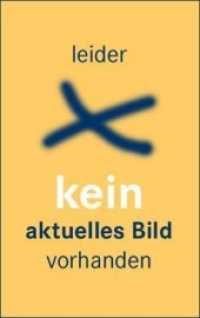Full Description
Does darkness lead to happiness? Is there corn in the corner? These are questions that make - to some extent - semantically sense, but for researchers interested in the role of morphology in word processing they make morphologically sense as well. This Special Issue on Morphological Processing is based on the 6th MOrphological PROcessing Conference MOPROC, which was organized in Turku, Finland and hosted researchers with a firm interest in questions like these. The special issue contains 13 articles that provide answers from different viewpoints, since it contains research on comprehension, production, and acquisition of morphology. Moreover, the articles present research in a number of languages with fundamentally different morphological systems. Apart from studies in West-Germanic languages (English and Dutch), the special issue contains studies in Romance languages (Spanish and Italian), in languages with very rich inflectional paradigms (Greek, Polish and Finnish) and in languages with non-concatenative morphology (Hebrew and Arabic). Moreover, it contains studies on all three major morphological classes: Inflections, derivations and compounds. Specific questions addressed in the volume deal with the time course with which morphemes come available, what factors facilitate their use, the role of orthographic and semantic transparency in complex word processing and how morphology should be incorporated in models of word processing. The chapters provide a wealth of empirical results obtained with state-of-the-art experimental paradigms. We hope that they will be an inspiration for further studies in morphological processing as much as we - living in Finland - hope that there is happiness in darkness.
Contents
J. Rueckl, A. Rimzhim, On the Interaction of Letter Transpositions and Morphemic Boundaries. J.A. Duñabeitia, M. Carreiras, S. Kinoshita, D. Norris, Is Morpho-Orthographic Decomposition Purely Orthographic? Evidence from Masked Priming in the Same-Different Task. E. Orfanidou, M. Davis, W. Marslen-Wilson, Orthographic and Semantic Opacity in Masked and Delayed Priming: Evidence from Greek. J. Morris, J. Porter, J. Grainger, P. Holcomb, Effects of Lexical Status and Morphological Complexity in Masked Priming: An ERP Study. K. Paterson, A. Alcock, S. Liversedge, Morphological Priming During Reading: Evidence from Eye Movements. S. Boudelaa, W. Marslen-Wilson, Productivity and Priming: Morphemic Decomposition in Arabic. B. Juhasz, R. Berkowitz, Effects of Morphological Families on English Compound Word Recognition: A Multi-Task Investigation. H. Bien, H. Baayen, W. Levelt, Frequency Effects in the Production of Dutch Deverbal Adjectives and Inflected Verbs. A. Deutsch, A. Meir, The Role of the Root Morpheme in Mediating Word Production in Hebrew. M. De Martino, G. Bracco, A. Laudanna, The Activation of Grammatical Gender Information in Processing Italian Nouns. D. Trafficante, S. Marcolini, A. Luci, P. Zoccolotti, C. Burani, How do Roots and Suffixes Influence Reading of Pseudowords? A Study of Young Italian Readers With and Without Dyslexia. E. Kidd, M. Kirjavainen, Investigating the Contribution of Procedural and Declarative Memory to the Acquisition of Past Tense Morphology: Evidence from Finnish. G. Krajewski, A. Theakston, E. Lieven, M. Tomasello, How Polish Children Switch from One Case to Another When Using Novel Nouns: Challenges for Models of Inflectional Morphology.








